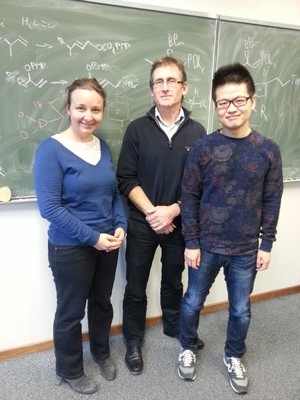New chemical reaction greener and less expensive
Researchers from the Stratingh Institute for Chemistry at the University of Groningen have discovered a sustainable way of producing a reaction that is important to the pharmaceutical industry .
‘Instead of a complex chemical reaction that produces all kinds of waste substances, we use a simple reaction with an inexpensive iron-based catalyst, whereby water is the only waste substance. You can understand how enthusiastic we are’, explains organic chemist Ben Feringa.

He and assistant professor Katalin Barta have written an article for Nature Communications (26 November), reporting that the research group has found a new way of producing amines (carbon-nitrogen compounds) directly from an alcohol (carbon-oxygen-hydrogen compounds).
Amines are an important raw material in fine chemistry and in the pharmaceutical industry. The method described by the Barta and Feringa team is already in use, but with catalysts that contain expensive or toxic metals. ‘We were familiar with the way the reaction works and knew about the iron compound. But despite numerous attempts around the world, nobody had managed to use iron as the catalytic agent in this application. We have now found the right conditions for producing the direct coupling reaction from an alcohol and amine using this iron catalyst.’
Apart from being cheaper, less toxic and not needing extra chemical reactions that produce waste substances, the new catalyst also works in an environmentally friendly solvent, CPME. ‘CPME is known to be highly durable.’
Feringa thinks that the new catalyst will be used for converting alcohol compounds from biomass into high-grade chemical products, including medicines, and may even replace other scarce metals in the long term.
This research project was devised by the research group recently set up by Katalin Barta, which focuses on green chemistry and sustainable catalysis. The main research line concerns the conversion of biomass into high-grade chemical building blocks and fuels. Lead author of the article in Nature Communications, Tao Yan, has a Master’s degree from the University of Rennes and has been working as a PhD candidate in Barta’s group since September 2013.
Reference: Tao Yan, Ben L. Feringa, Katalin Barta, Stratingh Institute of Chemistry, University of Groningen; Iron catalysed direct alkylation of amines with alcohols. Nature Communications, November 26, 2014
| Last modified: | 10 June 2015 2.56 p.m. |
More news
-
10 June 2024
Swarming around a skyscraper
Every two weeks, UG Makers puts the spotlight on a researcher who has created something tangible, ranging from homemade measuring equipment for academic research to small or larger products that can change our daily lives. That is how UG...
-
21 May 2024
Results of 2024 University elections
The votes have been counted and the results of the University elections are in!

